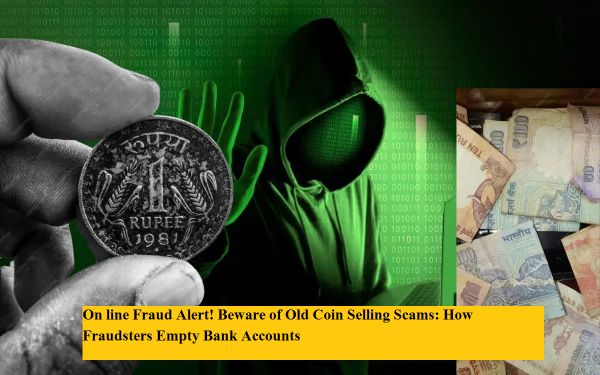
Online Fraud Alert: Selling Old Coins Could Cost You Lakhs!
Cyber fraud is becoming more sophisticated, and scammers are finding new ways to trap unsuspecting individuals. In a shocking incident, a man from Mangaluru lost ₹58.26 lakh while trying to sell old coins online. What started as a simple online transaction quickly turned into a massive financial scam. Let’s break down how the fraud unfolded and how you can protect yourself from such scams.
Cybercrime cases in India have increased fourfold in 2024, with fraudsters constantly devising new tricks to target people. One such recent scam involved an individual who wished to sell his collection of old coins but ended up losing his hard-earned money to cybercriminals.
The victim came across an advertisement on Facebook claiming to offer lucrative deals for selling old coins. The ad directed him to contact a WhatsApp number for further processing. Lured by the high prices promised for his rare coins, the victim reached out and expressed his intention to sell 15 old coins.
Initial Payment Trap – The scammers first asked for a small processing fee of ₹750 to initiate the transaction. The victim, considering it a routine charge, paid via UPI.
Multiple Fake Charges – After the first payment, the fraudsters continued demanding more money under various pretexts such as GST processing fees, insurance, TDS, GPS charges, ITR fees, and RBI clearance charges.
Police Impersonation for Blackmail – On December 15, the victim received a call from a fraudster posing as ‘Mumbai Cyber Police Commissioner’ Gaurav Shivaji Rao Shinde. The fake officer claimed that the Reserve Bank of India (RBI) had issued a notice against the victim and that he would be arrested unless he paid ₹12.55 lakh.
Final Blow – Fearing legal trouble, the victim transferred ₹9 lakh to a DCB Bank account on December 17. However, as the fraudsters kept demanding more money, suspicion finally set in.
As the scam continued, the victim became doubtful and started verifying the legitimacy of the callers. When he confronted the fraudsters, they resorted to threats. Realizing he had been scammed, the victim had already lost ₹58.26 lakh. He then approached the police and registered a complaint against the cybercriminals.
To ensure you don’t fall victim to similar fraudulent schemes, follow these precautions:
✔ Avoid Unrealistic Offers – If an advertisement promises extraordinary profits or quick cash, verify its authenticity before engaging. ✔ Never Share Personal Information – Do not disclose your bank details, OTPs, Aadhaar number, or other sensitive information via unknown links, calls, or messages. ✔ Use Secure Payment Methods – Only rely on official and secure payment gateways for transactions. ✔ Beware of Unknown Calls – If someone claims to be from a bank, police, or a government agency, cross-check their identity through official channels. ✔ Be Cautious on Social Media – Stay alert when encountering advertisements on Facebook, WhatsApp, or other platforms that seem too good to be true.
Scammers are constantly evolving their tactics, and the best defense is awareness. If you or someone you know is trying to sell old coins or collectibles online, verify the legitimacy of the buyer and never make advance payments without proper validation. Stay alert and protect your financial security!